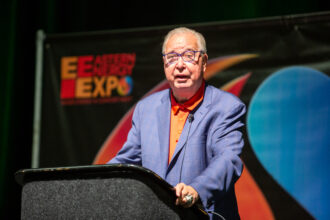Going All In
Shane Sweet talks with Chris Scaturro, who recently acquired a fuel company, about his decision to go “all in,” the “electrify everything” movement, and the future of heating oil and propane:
It was 1994 and Chris Scaturro was 12 years old. His grandfather owned a propane and oil company in the Hudson Valley of New York State. It was summer and Chris began working in the fuel business.
“I worked on the dock, and refurbishing tanks,” Chris told me. “Summer, vacation, holidays.” He was at the plant anytime he got the chance. “I just loved being there, being around the shop, being around the trucks, being around my grandfather and the staff.”
Seven years later, he graduated high school and, in 2003, the State University of New York at Delhi, where he studied HVAC/plumbing and heating. Immediately after college, he went back to the company, this time full time, starting as a delivery driver/service tech, and over the next 15 years held positions including Fleet Manager, Propane Dispatcher, Operations Manager and General Manager. Chris has continued working for family-owned fuel businesses since 2020, including as a propane operations manager, and last October he joined Upstate Energy in Gardiner, N.Y. In June, he bought the business, going “all in.”
“Well, that certainly demonstrates commitment,” I said. “Diving in headfirst when so many would have the fuel industry as we know it, go away, says something.”
Chris responded, “I’ve had my share of people tell me I’m crazy going into the fuel business given the hostile environment of New York State towards anything fossil fuels. Those that would electrify everything don’t want to talk about our existing infrastructure or the risk to all of us when electrification goes sideways, and it will, or the fact that we are in a position to provide renewable fuels as a constituent of our traditional fuels today.”
Though Chris acknowledged that there is still work to be done to ensure renewables are there to blend, he’s talking about BioHeat and renewable propane.
“It’s a farce, this notion that one energy source” — electricity — “is the solution,” Chris added.
He struggles with public policy initiatives pushed by politicians and government bureaucrats who have designated themselves arbiters of how we should heat our homes and how we should fuel our vehicles. He’s frustrated that those people, organizations and government bureaucrats pushing electrification, in his words, “won’t give us the time of day.” They avoid talking about the relatively low barrier of renewable liquid fuels integration versus the astronomical costs of moving us to “all electric.”
“We all know the ‘Electrify Everything’ crowd either has no idea what that [electrification] might cost or will not say the number out loud for fear of scaring away those that will end up paying the bill,” Chris said.
The Electrify Everything propaganda machine has its “pedal to the metal,” Chris said, and he’s astonished so many consumers either believe it is the smart way to go, or are not worried about it.
“Existing fuels and existing infrastructure deliver emissions improvement without forcing one energy source down the throats of the majority of unwilling energy consumers,” Chris said. “I don’t do business at the barrel of a gun and neither should lawmakers, government and nonprofits.” Energy choice is a big part of this, Chris said. Integration of renewables into traditional fuels is happening now, and is happening without the huge bill to consumers and society as a whole that comes with electrification.


